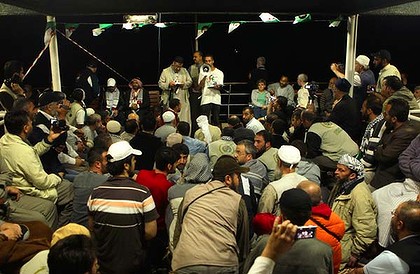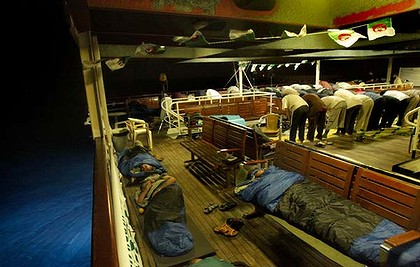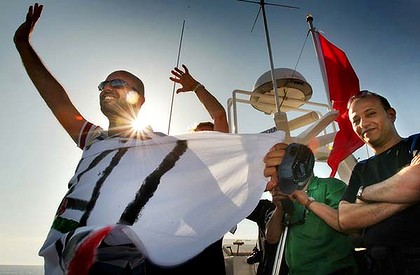BREAKING NEWS: Ten people have reportedly been killed and more than 30 injured after Israeli forces attacked a flotilla seeking to break through a naval blockade of the Gaza Strip.
Contact with Herald journalist Paul McGeough, who is on board one of the flotilla vessels, has been lost.
This is what McGeough filed earlier before contact with the flotilla was lost ...
 |
| A crowd gathers for a meeting at the stern of the MV Marmara passenger boat, part of the Free Gaza flotilla. Photo: Kate Geraghty |
11.45pm: For the past hour, we have been observing a series of lights beyond the six sets of lights that are the flotilla ships. Were they non-military sea traffic, or was the Israeli Navy on top of us? Kate Geraghty uses her biggest lens to capture an image of what we can't really see. Blown up, it is too grainy to publish, but at the same time, clearly, it is a navy vessel. There are two on either side of the flotilla, at a distance of more than one kilometre.
 |
| Activists sleep and pray on the Turkish passenger ship MV Marmara carrying 600 activists, part of the freedom flotilla headed to Gaza. Photo: Kate Geraghty |
10.55pm: Reading the call as intimidation, Free Gaza Movement chairwoman Huwaida Arraf rejected it out of hand.
10.50pm: The Israeli Navy engaged the flotilla, making a radio call to each ship or boat, warning the captains they were not welcome in Israeli waters, and that they were putting themselves, their passengers and their vessels at risk by attempting to proceed to Gaza. (Listen to Paul McGeough's report)
The first call came on a sultry Mediterranean about 10.30pm, with a sky filled with stars and a stunning orange moon reflected off oily waters as those on the ships sensed they were being shadowed.
The MV Challenger I, renamed Samoud, which in Arabic means steadfast, and on which myself and photographer Kate Geraghty are travelling, received its own blunt warning not to proceed.
 |
| Activists on the Amal passenger boat wave farewell as they set sail from Aghios Nikolaos in Crete, Greece, to join the Free Gaza flotilla. Photo: Kate Geraghty |
10.25pm: The flotilla is still in international waters when the big Turkish passenger ferry - carrying 600 Turkish and other national supporters of the Palestinian people - is warned by a male speaker who radios a demand for the nationality of the ship and of its passengers and its last port of call.
10pm: In Jerusalem, senior officials of the Foreign Ministry meet to finalise their plans for dealing with the Free Gaza flotilla, which, the Israeli government has repeatedly warned, will not be allowed into Gaza.
May 31, 2010: The protest business requires patience - especially with a plan as audacious as crashing a fleet of ships through Israel's naval blockade of Gaza. Inevitably, the slowest boat sets the pace for all. Days at sea can be lost to mechanical failure or efforts to pressure governments into making it difficult for celebrity activists and supporters to get on board. Full report
May 30, 2010: Turkish human rights activist Bulent Yildirim is pleased with his floating resistance camp on the Mediterranean. Men dangle fishing rods over the rails; another flies a kite. There is a dodgy dealer direct from central casting, who ambles the decks as he tests foreign interest in a Turkish property development. Read full report.
The Sydney Morning Herald

